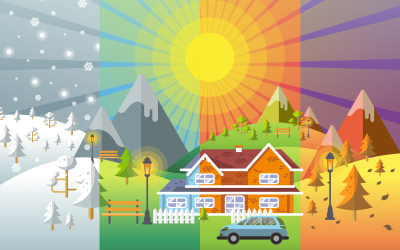Dallas: (972) 548-0088
How Seasonal Weather Affects Attic Insulation Efficiency

Attic insulation efficiency is a homeowner’s best friend. Simply put, it separates your conditioned living space from your unconditioned attic space, trapping heat and slowing down energy loss—AKA helping reduce your energy use. One of the biggest effects on your attic insulation is the weather. From cold temps to high humidity and everything in between, read on to discover how your insulation can maintain peak performance, even with the weather impact on insulation.
The Role of Insulation in Home Energy Efficiency
Homeowners can choose from several effective attic insulation options, including budget-friendly fiberglass, highly efficient spray foam and eco-conscious cellulose made from recycled paper. Whichever route you take, your insulation has the potential to slash your heating and cooling costs by up to 50%, according to the Department of Energy.
Spring and Fall: Transitional Seasons’ Effect on Insulation
Temperature Fluctuations and Insulation Adjustment
Extreme temperature swings can take a toll on your insulation. Summer heat can potentially compress materials, while winter moisture risks decreased effectiveness through condensation. Seasonal insulation maintenance in the spring and fall can save you loads (of dollars) of trouble come summer and winter.
Seasonal Maintenance and Inspection
The transitional seasons are the best time to prevent seasonal attic insulation issues. A pre-season inspection should include examining for gaps, compressed areas and proper depth. Make sure to look around eaves and corners where insulation tends to shift. Fall is the perfect time to search for any summer damage and seal air leaks, while spring maintenance can focus on checking for winter moisture damage and ensuring proper ventilation.
Impact of Winter Weather on Attic Insulation
Heat Loss in Cold Climates
During the winter months, insulation prevents (expensive) heated air from escaping through your attic, which accounts for up to 25% of home heat loss. However, common winter issues can compromise this protection, with sneaky gaps around pipes and vents. Accumulated moisture from poor ventilation can cause insulation to compress and lose effectiveness. Ice dams forming on your roof’s edge are often also a telltale sign of insulation problems. They can indicate that warm air is escaping and melting snow, which then refreezes at the roof’s colder edge.
Winter Attic Insulation Tips
Here are a few ideas to help prevent the effects of poorly insulated attics in the winter. Sealing air leaks, adding extra insulation—consider adding some around the attic door or hatch—and properly ventilating the space are a few bulletproof ways to save energy in the colder months.
Summer Heat and Attic Insulation Performance
Preventing Heat Gain in Hot Climates
Just like in the winter months, your summer insulation performance could impact your energy bill. In the summer, insulation traps air pockets and acts as thermal resistance, minimizing the flow of heat from your attic to your living space. Which, in turn, doesn’t force your AC to work as hard and leaves you with a lower energy bill.
Ventilation and Insulation Balance in Summer
Understanding insulation for extreme weather, like higher temps in the summer, is important for every homeowner. Proper attic ventilation helps avoid hot weather insulation problems—physical degradation, moisture issues, and potential material compression.
Weather-Related Factors That Can Affect Insulation Efficiency Year-Round
Wind and Air Leaks
Wind and air leaks are two more weather-related variables that can affect your insulation, no matter the time of year. High winds can force outside air into your attic through small cracks or gaps. This air infiltration can lead to warm air escaping in the winter or entering in the summer, furthering the insulation value. Furthermore, wind-driven air leaks can create drafts, reducing your home’s overall energy efficiency.
Excessive Heat Build-Up
In warmer climates, attics can reach extremely high temperatures in the summers. Without proper insulation, heat can transfer into living spaces, causing your air conditioning system to work harder and reducing overall energy efficiency. Poor ventilation can trap heat, reducing the lifespan of insulation materials and increasing the attic’s temperature, making it harder to cool your home effectively.
Improving Insulation Efficiency Based on Seasonal Changes
Improving attic efficiency may sound complex, but it’s truly simple. While there are steps you can take to prevent damage, seeking professional help is always a great idea. Energy Attic has a team of pros ready to help you restore your attic to an optimal state. Our selection of energy-saving plans are tailored to each customer, because each attic is different and should be treated as such.
Get in touch with Energy Attic
Overall, seasonal weather has a profound impact on the health of your attic energy. Preparing for summer and winter in the transitional seasons can help you save money on energy—because insulation in cold weather or high heat will certainly impact your energy use. Make sure to assess your attic and call an expert as needed before the next extreme season.
